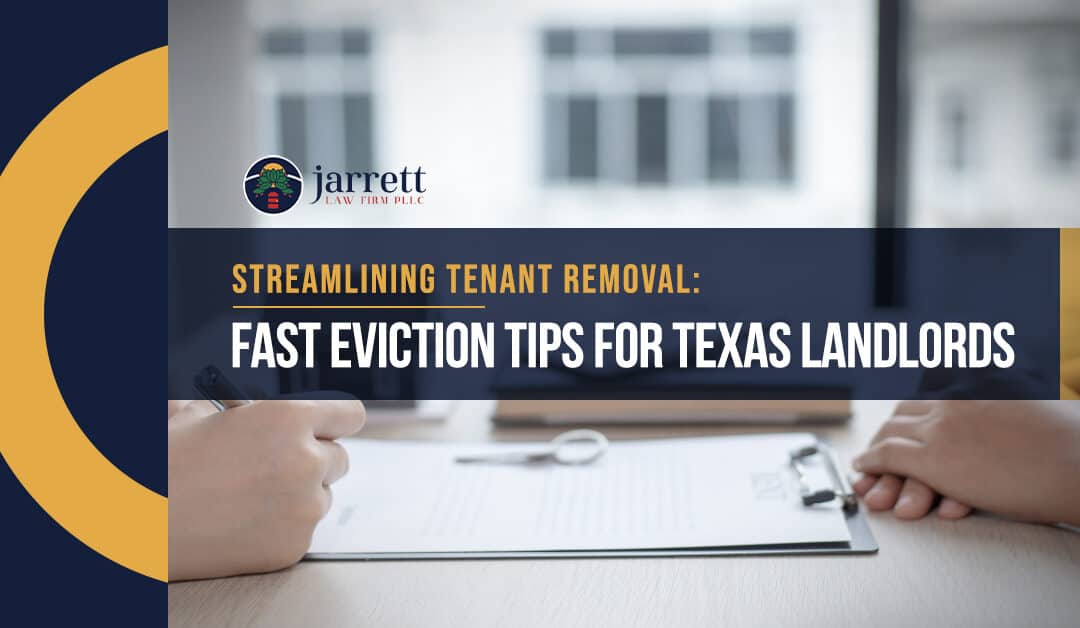Understanding the eviction procedures is crucial for landlords in Texas. It helps in maintaining property rights and ensuring a continuous rental income. But eviction can take time you don’t have. Read on for a brief overview of the Texas eviction laws, focusing on how to work out a fast eviction process.
Understanding the Eviction Process in Texas
In Texas, eviction laws are outlined in the Texas Property Code, Chapter 24. According to Section 24.002 of the Texas Property Code. A person commits a “forcible detainer” if they refuse to surrender possession of real property on demand.
This situation arises if the person is a tenant holding over after the termination of their right of possession, a tenant at will or by sufferance, or a tenant of a person who acquired possession by forcible entry. (1)
Pre-Eviction Procedures
Before initiating the removal process, you must communicate clearly with tenants regarding the lease agreements and terms. You’ll need to address any rent arrears or other lease violations and serve proper notices.
In Texas, landlords cannot legally remove a tenant without cause. Legal grounds for eviction include the following:
- Not paying rent on time
- Staying after the lease ends
- Violating lease terms
- Not upholding responsibilities under Texas law (2)
Notice to Vacate
The first formal step in the process is serving a notice to vacate. Unless specified otherwise in the lease agreement, Texas law requires landlords to provide at least three days written notice to the tenant to vacate the premises before filing an eviction suit. This notice period can be shorter or longer if agreed upon in a written lease or agreement. The notice to vacate should be given in person or by mail at the premises in question. (3, 4)
Initiating A Fast Eviction Process
Once the notice to vacate has been duly served and the notice period has lapsed without the tenant vacating the premises, the next step for the landlord is to initiate the removal process. This process is officially known as filing a forcible detainer suit.
Filing an Eviction Suit
In Texas, a landlord can initiate the eviction process by filing a forcible detainer suit in the justice court of the precinct where the property is located.
According to Section 24.004 of the Texas Property Code, a justice court in the precinct where the real property is has jurisdiction in eviction suits.
Eviction suits include forcible entry and detainer and forcible detainer suits, and a justice court has jurisdiction to issue a writ of possession under certain sections of the Texas Property Code. (5)
Abiding by Waiting Periods and Court Dates
After filing the forcible detainer suit, there’s a waiting period before a hearing is scheduled. During this period, the landlord must prepare thoroughly for the hearing by gathering all necessary documentation and evidence supporting their case.
This may include finding the following:
- Lease agreement
- Records of payment
- Notice to vacate served to the tenant
- Any correspondence between the landlord and tenant regarding lease violations or other issues
Following Legal Protocols
It’s essential to follow the legal protocols outlined in the Texas Property Code and other relevant statutes during the process to ensure a smooth and lawful removal of the tenant(s).
Adhering to the legal requirements not only facilitates a faster removal but also protects the landlord from potential legal issues that might arise from wrongful legal practices.
Attending the Eviction Hearing
The hearing is a critical phase in the process where the landlord presents their case before a judge. The outcome of this hearing can either grant the landlord the right to reclaim their property or dismiss the eviction case, hence the importance of proper preparation.
What to Expect During the Eviction Hearing
During the eviction hearing, the judge will review the evidence presented by both the landlord and the tenant. The landlord should be prepared to present all necessary documentation. The tenant will also be able to present their side of the story. The landlord must remain professional, factual, and respectful throughout the proceedings.
Necessary Documentation and Preparation for the Hearing
Thorough preparation for the eviction hearing involves gathering all requisite documentation substantiating the landlord’s claims. This includes:
- Lease agreement
- Notice to vacate
- Records of rent payments and any other relevant financial records
- Photographs or videos showing the condition of the property, if applicable
- Any correspondence between the landlord and tenant regarding the issues at hand
Landlords should organize these documents neatly and have copies ready for the court.
Emphasizing Adherence to Law and Fact-based Argumentation
The landlord must base their arguments on factual information and adhere to the legal framework governing evictions in Texas. This not only supports the landlord’s case but also demonstrates a commitment to following the law, which could favorably impact the judge’s decision.
Post-Judgment Procedures
Following the eviction hearing, if the judge rules in favor of the landlord, the next steps involve executing the court’s order to regain possession of the property. Understanding and following the post-judgment procedures is essential to ensure a smooth transition and to uphold the legal and professional standards expected of landlords in Texas.
Obtaining a Writ of Possession
In cases where the tenant fails to vacate the property voluntarily after the judgment, the landlord may obtain a writ of possession. A writ of possession is a court order that authorizes local law enforcement to remove the tenant and their belongings from the property.
According to Section 24.0061 of the Texas Property Code, a landlord may request a writ of possession if the tenant has not appealed the judgment and has failed to vacate the property within five days from the date of judgment.
Coordinating with Local Law Enforcement
Once the writ of possession is obtained, it’s essential to coordinate with the local law enforcement authorities to schedule the eviction. The law enforcement officers will oversee the eviction to ensure it’s carried out professionally and without any breach of peace.
It’s advisable for the landlord to be present during the eviction to handle any issues that may arise and to take possession of the property.
Providing Notice to the Tenant Regarding Property Removal and Storage
Texas law stipulates that landlords should notify the tenants regarding the removal and storage of their belongings. According to Section 24.0062 of the Texas Property Code, if a landlord removes and stores a tenant’s property, the landlord must deliver a written notice to the tenant.
The notice must include the name and address of the storage facility and the dates the landlord will allow the tenant to claim the property.
Maintaining a Professional Conduct
Throughout the post-judgment procedures, maintaining a high level of professionalism and adherence to the legal requirements is crucial. It not only ensures a smooth eviction process but also protects the landlord from potential legal liabilities.
Following the correct post-judgment procedures after a favorable eviction ruling is crucial for a swift and lawful transition of property possession. Consult with legal professionals to ensure you fully understand and adhere to the post-judgment procedures stipulated by Texas law.
Maintaining Professionalism and Compliance
Evicting a tenant can be challenging and, at times, emotionally charged. However, landlords must maintain a high degree of professionalism and compliance with the law throughout the process.
This not only aids in ensuring a smooth eviction but also in upholding the landlord’s reputation and minimizing legal risks.
Professional Conduct During Eviction
Maintaining a respectful and professional demeanor towards the tenant, even in challenging situations, is essential. Respectfully communicating, adhering to legal protocols, and avoiding confrontational or aggressive behavior are crucial aspects of professional conduct during eviction.
Abiding by Legal and Procedural Guidelines
It’s crucial to abide by all the legal and procedural guidelines outlined in the Texas Property Code and other relevant statutes throughout the eviction process. This includes providing proper notice, following court procedures, and adhering to post-judgment protocols. Ensuring compliance with these legal requirements not only facilitates a smoother eviction process but also protects the landlord from potential legal pitfalls.
Seeking Legal Advice
Given the legal complexities surrounding eviction, it makes sense for landlords to seek legal advice to ensure they are fully compliant with Texas eviction laws.
Consulting with a legal professional can provide valuable insights into the eviction process and help prevent any missteps that could delay eviction or result in legal liabilities.
Avoiding Retaliatory Evictions
Texas law protects tenants from retaliatory evictions. Landlords need to ensure that the eviction is based on lawful grounds and not in retaliation for tenant actions that are protected by law, such as reporting housing code violations.
Bottom Line
Maintaining professionalism and adherence to legal and procedural guidelines is fundamental for a successful and smooth eviction process. It also sets a positive precedent for future landlord-tenant interactions and helps in building a good reputation in the community.
As eviction laws and procedures can be complex, it’s essential to consult an eviction attorney to ensure compliance with Texas eviction laws and to navigate the eviction process successfully.
Jarrett Law Provides Fast Eviction Service
At Jarrett Law, we understand your predicament as a landlord trying to remove a tenant who may be causing issues or not adhering to the lease agreement. Evicting a tenant is a legal process that requires a meticulous approach to ensure compliance with Texas state laws. Our seasoned attorneys are here to provide the guidance and representation you need to navigate the eviction process swiftly and efficiently.
With a history of assisting landlords in regaining control of their properties, we bring a wealth of experience and a comprehensive understanding of Texas eviction laws to the table. We aim to make the eviction process as straightforward and stress-free as possible for you.
Our personalized services include issuing the notice to vacate, filing the eviction suit, representing you in court, and executing the writ of possession. We handle each step of the eviction process with utmost professionalism and legal precision.
Our fast eviction service is designed to expedite the eviction process while ensuring full compliance with the law, minimizing the chance of legal backlash. We keep you informed at every stage of the process, ensuring you understand the proceedings and the expected timelines.
At Jarrett Law, we prioritize your peace of mind and the swift recovery of your property. Contact us today to learn more about our fast eviction services and how we can support you in resolving your tenant issues in a timely and legal manner.

